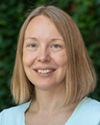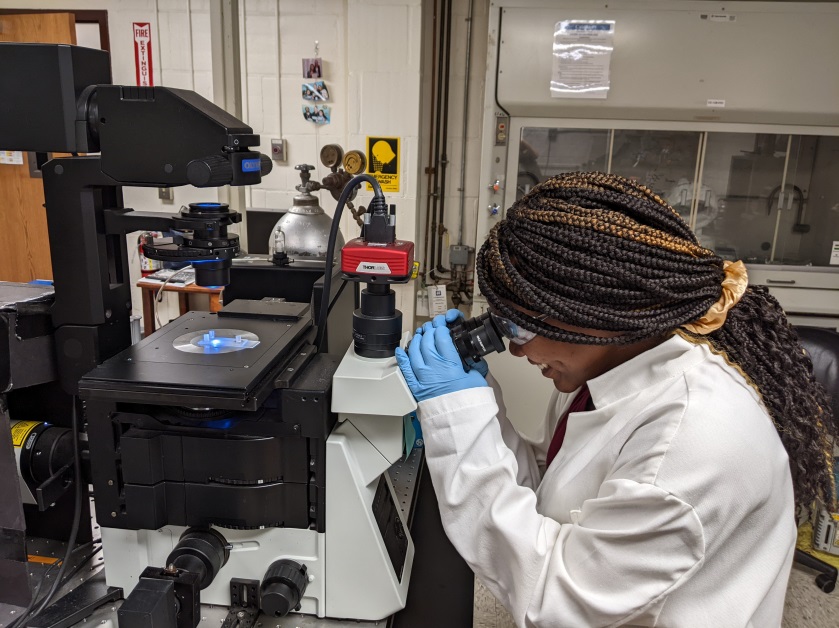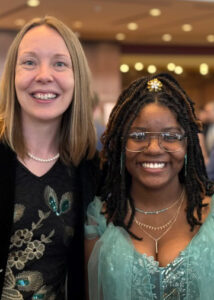Chemistry Professor’s Grant Funds Research Experience for High School Students
An American Chemical Society (ACS) SEED grant awarded to a Trinity College chemistry professor allowed a high school student to complete chemistry research at the College during the summer.

Last summer, Michelle Kovarik, Gregory G. Mario ’87 Professor of Chemistry and faculty co-director of Trinity’s Center for Teaching and Learning, hosted a student from Hartford Magnet Trinity College Academy (HMTCA) who assisted her in the lab. “They could see the chemistry field from an expert perspective, not simply a student’s,” said Kovarik.
The summer of 2024 marked the third time Kovarik has received the ACS SEED grant, and she plans to apply for funding again in 2025. ACS was founded in 1876 with a mission to “advance the broader chemistry enterprise and its practitioners for the benefit of Earth and all its people.” Project SEED is designed to “provide sustained STEM research, learning, and growth opportunities for high school students with diverse identities and socioeconomic backgrounds so they can be empowered to advance and enrich the chemical science enterprise.”
Kovarik first applied for the SEED grant in the summer of 2022 after receiving a National Science Foundation (NSF) Research in Undergraduate Institutions (RUI) award. She had always understood the importance of students in the lab, but saw that this program could be beneficial to both high school students and college undergraduates.

In 2022, Kovarik advertised the opportunity to guidance counselors and students at HMTCA, hoping to draw in eager young chemists. This proved to be a challenge for institutions still dealing with the COVID pandemic, but Kovarik persisted and found an eligible student who began research work.
“The chemistry that the average student takes in high school is just a baseline of knowledge, not what chemists do,” Kovarik said. “This program allows students to see early on before they have committed intellectually if chemistry is a profession they’re interested in.”
Working closely with students in the lab, Kovarik guides each student on specific projects, such as analyzing oxygen levels in cells and using computerized design for cell analysis. Throughout this process, students became more independent, learning how to run scientific instruments and analyze the data.
“What’s unusual about my ACS SEED grant is that the learning extends further than just the eight weeks during the summer. One student ending up attending Trinity and another is enrolled in two classes for a Trinity credit while still in high school,” said Kovarik.

Asia Hamilton ’27 originally worked with Kovarik as part of this grant during the summer after she graduated from high school. Hamilton then decided to attend Trinity, and now as a student she will be presenting her work at the National Organization of Black Chemists and Chemical Engineers Conference in Orlando in October, then at Pittcon, an analytical chemistry conference in Boston in March.
Hamilton, a biology major and environmental science minor, said, “It was very challenging at first, but as I settled in, I had lots of fun working with Professor Kovarik and conducting experiments with the cells. It was a dream come true for me. Now, in college, I can see just how valuable that has been to my college career as I have built skills in problem-solving, consistency, and resilience that have allowed me to pursue my interests at Trinity, like continuing research and other STEM-related endeavors.”
High school students selected for this program through the ACS SEED grant become clear standouts on college applications, and are eligible for certain scholarships open only to project SEED participants, Kovarik said.
In the future, Kovarik hopes to grow her research site at Trinity to include more students per summer. After successfully hosting students for several summers, Kovarik feels the logistics are determined and the program can flourish. “Having them be able to work together, share ideas, and consult with each other would be beneficial to them as scientists and as students,” she said.
To learn more about ACS Project SEED, click here.
